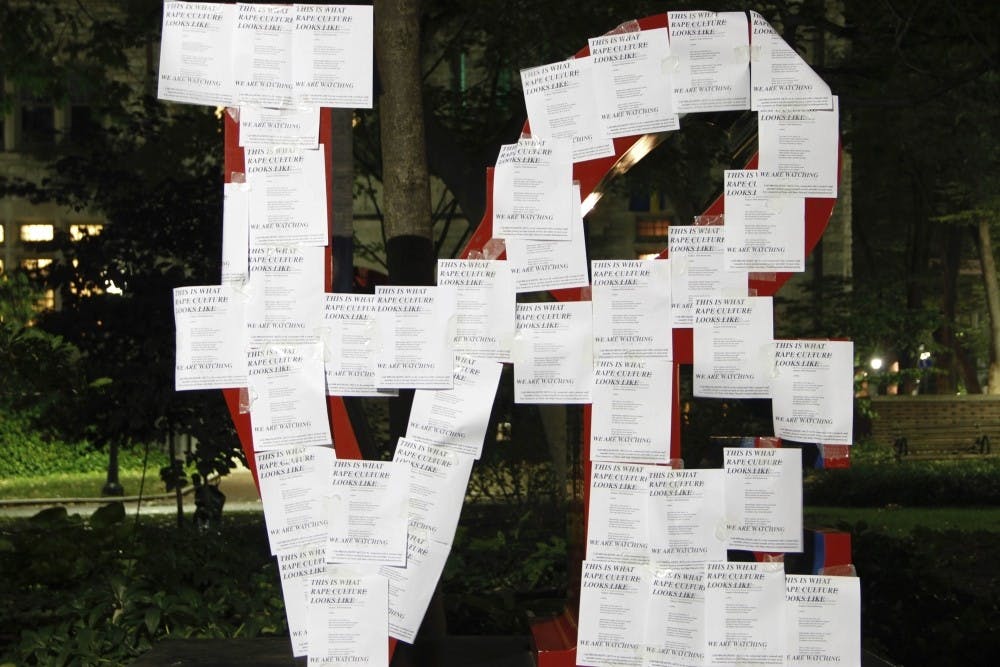During New Student Orientation, I, along with all of my classmates, was required to attend panels and information sessions about sexual assault on campus. To my surprise, many students skipped these events, and a large portion of those who attended spent the whole time giggling or on their phones.
Nearly every weekend, I hear about friends who have been groped and kissed without warning at fraternity parties. With each new woman I meet in college comes a unique horror story of unwanted sexual attention from men. It’s becoming a rarity for me to meet a woman who hasn’t been sexually assaulted at Penn. I’ve only been a student here for six months; this is just the tip of the iceberg.
According to a 2015 Report from the AAU Campus Climate Survey on Sexual Assault and Sexual Misconduct, since entering Penn, 12 percent of female undergraduates experienced non-consensual penetration and 20.8 percent were victims of unwanted touching.

Penn, we have a problem. And we’re just starting to recognize it, on campus and beyond. Following the sexual misconduct allegations that recently surfaced against Harvey Weinstein, women around the world have been using #MeToo to indicate that they have been assaulted. Women at Penn have contributed to this movement as well. At the end of last semester, 34th Street Magazine published an issue devoted to the stories of sexual assault survivors at Penn.
It’s time for men to take action.
“Maybe it starts with something more immediate, which is just educating yourself and reading the news,” College senior Nico Carrino said. Carrino is the president of Men Against Rape and Sexual Assault, an on-campus organization dedicated to educating men about sexual assault awareness and rape prevention. “The next step, I guess, from there, is talking to people about it.”
Sexual assault is hard to understand. The lines that define it are blurred. This is not intended to call out men; it’s a call to action. You can start to tackle this difficult issue by reading, engaging in difficult conversations, and being active bystanders.
SEE MORE FROM ISABELLA SIMONETTI:
Stop swiping and take a break from Tinder
We can fix Penn's toxic culture more than the administration ever could
While there are numerous student groups like MARS, as well as organizations like Street, dedicated to addressing this issue, the current campus culture is dangerous.
The party scene is overwhelmingly Greek, particularly for freshmen, who are arguably the most vulnerable group on campus. A 2015 study from the Journal of Adolescent Health, entitled “Incapacitated and Forcible Rape of College Women: Prevalence Across the First Year,” found that “out of the 483 women surveyed from an unnamed private university in the northeastern U.S., 18.6% reported instances of attempted rape beginning when they arrived on campus into the following summer.”
“I think that there’s an issue with the fact that, yeah, the majority of parties and organized social spaces on campus are strictly male,” Carrino said. “The people who are providing alcohol, the people who are providing the space, the bartenders, the bouncers … ”

When I’ve attended fraternity parties, the brothers at the door judge us — if my friends and I are hot enough, if we’re wearing clothing that’s tight enough, if they want to hook up with us. This is how they decide if we will be let in. This is the kind of space that dominates Penn’s social scene.
I urge men in male-dominated groups to first acknowledge that sexual assault is a prominent issue on this campus and then educate themselves instead of remaining acquiescent to a system that fosters a harmful culture toward women. #MeToo alone is not enough to stimulate change. The movement demands the participation of all men.
The frequency of sexual misconduct on this campus is shameful. After reading some of the responses to the recently released seuxal harrassment survey in academia, the scope and gravity of the issue becomes even more transparent.
One adjunct instructor from the University of Nebraska noted that she was “[s]talked, harassed, threatened by a colleague who also threatened the safety of my toddler daughter.”
An undergraduate at an unspecified Canadian university also said, “When I was an undergraduate, the head of the department slapped my behind with a rolled up newspaper while I was walking down the hall. Another time, I caught him staring at my chest while we were having a meeting about planning an undergraduate event.”
These are some of the thousands of stories that have been shared, and many remain untold. It’s a terrifying epidemic that demands participation from everyone. There are so many influential parts of this campus where male students have all the power, while women are helpless and vulnerable. Men, help us fight rape culture. We can’t address it without you.

ISABELLA SIMONETTI is a College freshman from New York studying English. Her email address is simonetti@thedp.com.



